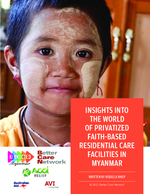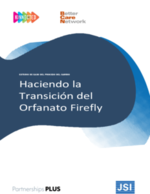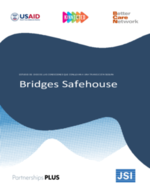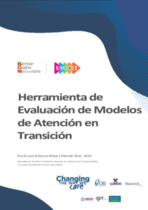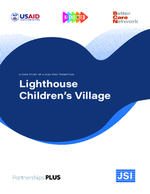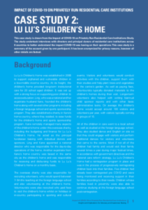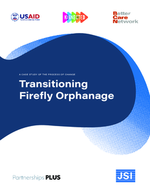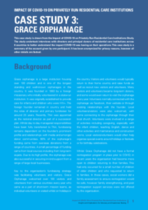In 2011, ACCI Relief (ACCIR) established the Kinnected Program, which seeks to preserve and strengthen families, scale down the overuse of residential care, and advocate for care reforms globally.
The Kinnected Program seeks to take a proactive approach to scaling down the use of residential care and assisting children within the context of their families. ACCIR is the aid and development arm of the Australian Christian Churches (ACC) movement.
Based in Australia, Kinnected works within the country to
- Conduct education and awareness about the harmful effects of long-term residential care
- Advocate for children’s rights in faith based communities
- Provide consultancy services for churches and organisations regarding child welfare programs
Contact this organization about:
Organization Size
Headquarters Location
SA
Australia
Organization Type
Main Areas of Work
Transition Support Services for Donors of Residential Care
Guidance and coaching provided throughout all stages of the transition process:
- Awareness Raising
- General awareness raising for transition
- Targeted awareness raising with key stakeholders
- Linking key stakeholders to relevant resources
- Connecting key stakeholders with peers that can share their own stories of transition
- Communications strategies for key stakeholders and wider donor base
- Planning for Transition
- Conducting comprehensive organisational assessments and audits of both donor entities and implementing organisations
- Addressing any gaps in registrations, decision-making structures, board governance, policy frameworks, staff employment contracts, codes of conduct
- Conducting project and child risk assessments
- Developing risk mitigation strategies and sabotage response plans
- Leading discussions regarding post-transition services and developing program frameworks
- Securing and formalising buy-in from key stakeholders including leadership, board members, principal donors
- Developing a bespoke strategic plan for transition
- Reintegration
- Ensuring key stakeholders understand and work within their assigned roles and responsibilities
- Implementing the strategic plan for transition
- Addressing any challenges that may arise once the social work process is underway
- - Responding to any disclosures or allegations of abuse/exploitation of children/staff
- Determining the most appropriate pathway to full transition/safe closure
- Exploring and guiding the divestment process where appropriate
Transition Support Services for Residential Care Directors
Guidance and training provided throughout all stages of the transition process:
- Awareness Raising
- Targeted awareness raising with key stakeholders, including founders, board members, spouses of directors, staff, families, and children
- Linking key stakeholders to relevant resources
- Connecting key stakeholders with peers that can share their own stories of transition
- Communications strategies for key stakeholders and wider donor base
- Planning for Transition
- Conducting comprehensive organisational assessments and audits of implementing organisation
- Addressing any gaps in registrations, decision-making structures, board governance, policy frameworks, staff employment contracts, codes of conduct - Conducting project and child risk assessments
- Developing risk mitigation strategies and sabotage response plans
- Leading discussions regarding post-transition services and developing program frameworks
- Securing and formalising buy-in from key stakeholders including leadership, board members, principal donors, founders
- Developing a bespoke strategic plan for transition together with the principal donor
- Reintegration
- Ensuring key stakeholders understand and work within their assigned roles and responsibilities
- Implementing the strategic plan for transition
- Addressing any challenges that may arise once the social work process is underway
- Responding to any disclosures or allegations of abuse/exploitation of children/staff
- Exploring or implementing post-transition services, where appropriate
Reintegration
In-country social work teams are typically external units that work alongside the organisations undergoing transition. Case workers are trained specifically in the reintegration of children exiting from long-term privately-run institutions and play a critical role in preparing children and families for reunification and permanency in placements. Many use their own robust case management procedures to supplement their national case management systems, with a particular focus on the family reconnection phase prior to placement determination.
Placements are predominantly kinship care but other placements and services include community-based foster care, semi-independent living arrangements, and support for young people to safely leave care. Some projects include community development programming and support for local schools to prevent family separation.
Family Preservation and Abandonment Prevention Projects
These are services that seek to identify families at risk of imminent breakdown and provide intense support services to prevent separation and/or child abandonment.
Advocacy, Research, and Peer Learning Exchange
In collaboration with a wide range of networks, organisations, and individuals, Kinnected has led legislative reforms curtailing the use of Australian charity funds for overseas residential care programming, participated in research studies on privately-run institutions, and facilitated the exchange of practitioner learning on transition support through case studies, publications, peer group trainings, and regional study exchange tours.
Family-Based Care Projects
Kinnected’s family-based alternative care services provide children who legitimately require emergency, short-term or longer-term alternative care with family based options such as kinship care and foster care.
Community and Family Strengthening Programs
These initiatives strengthen both the family and community’s ability to care for, protect and provide for their own children. They include services such as day care, early childhood education, disability support programs, family counselling and case management, child-centered community development, bridging education, livelihood assistance and children and women’s clubs.
Reintegration and Reunification Projects
Kinnected works with numerous residential care centres to assist them undergo the process of deinstitutionalisation. This includes developing reintegration, family reconnection and reunification programs to ensure children have the opportunity to be reunified with their family or transition into family-based care where possible. Kinnected also runs a street children’s reintegration program whereby children living on the streets are reunified with their families and access supportive services in their communities.
Consultancy and Technical Support
Kinnected also offers consultancy and technical support to come along side organisations running long term residential care and assist them to undergo deinstitutionalisation. Kinnected staff and consultants work with organisations to develop strategic plans and provide the necessary technical support, training, tools and guidance to ensure organisations are able to transition their programs in a safe and effective manner.
Keeping Families Together Nepal: Residential Care Service Transition Support
Transition supports they have offered, or plan to offer, include:
- Introducing the importance of family care and reintegration to leaders in the organization
- Strategy and planning for the transition
- Donor and board engagement
- Community awareness raising and engagement
- Partnerships
- Government engagement and linking to systems reforms
- Social work or case management training or support
- Staffing adjustments or training
- Use of buildings and other assets
- Developing new programs, including:
- Family and community strengthening
- Alternative family care (including kinship care, foster care, adoption)
- Advocacy
- Provide funding for the transition
- General coaching or consultation
- Onsite training
- Online training
- Onsite visits/meetings
- Phone calls/video conference
- Provision of standards and written guidance or tools for transitioning
- Connecting with others or building a network
ACCI Relief plans to focus their transitioning support in Myanmar, Cambodia and Nepal Potentially - Kenya, Lesotho, Sri Lanka, Thailand (Myanmar border regions)
Determining if and how we support organisations to transition is determined on a case by case basis and we remain very flexible as each organisation is so unique.
We asked this organization to tell us a little more about their learning and knowledge sharing practices. Here is what they said
As transition support is fairly new territory, the nature of our work pushes us to trial new approaches and constantly adapt and fine tune them, based on both internal reflection and external feedback. We always ask ourselves what we could have done better and publicly share our lessons learned to prevent others from making the same mistakes we did. We value transparency and learning over reputation and believe that this approach will lead to better outcomes for children.
Working in formal partnership with organisations and entities that fund residential care has provided us with an opportunity to develop a model for donor-led transitions. While the majority of transition and closure work is currently either director-led and voluntary or government-mandated, we have been able to pilot methods for engaging donors to initiate and sustain transitions in cases where directors are reluctant or resistant.
Formalising the partnership through a written agreement between donors, directors, and the technical support agency, and clearly outlining the terms and expected timeframe of transition, can help keep a transition process on track rather than allowing it to stall indefinitely. As part of this agreement, developing and agreeing on clear response plans to potential child protection concerns and director resistance/sabotage that may emerge later in the transition process can also help ensure that everyone will be held accountable to protecting the safety of children.
Fully consider and remain open to the possibility of pathways to safe closure, divestment, and/or reporting to the appropriate authorities. While a pathway to full transition with post-transition services might be the ideal, it is unrealistic in many situations and harmful in others. Preparing for closure/divestment in medium- to high-risk transitions and exploring alternative ways to continue to support the children in care can help ensure that donors remain engaged throughout the process rather than suddenly disengaging due to the lack of progress in transition
Extracting and disseminating learning is one of Kinnected’s primary areas of work and we apply the same principle across our own organisational practice. We have developed numerous case studies reflecting on our own experiences of providing transition support and have incorporated the learning from them into our current approaches. We have conducted and participated in various qualitative research projects with the aim of better understanding our target groups, including an evaluation of the methodology and impacts of providing technical support to our own partners. Quarterly progress reports from our partners help us to regularly evaluate the impacts of our support and adjust our approaches when necessary. In 2020, we established the Kinnected Advisory Committee with the aim of embedding expert guidance and accountability into our strategic planning and program development. Committee members provide feedback on key strategic documents and new program ideas, assist in identifying program risks and mitigation strategies, and provide accountability around set goals and the achievement of outcomes. The committee is composed of national leaders from our key partner organisations, representatives of the ACCIR Board, and other specialists in the fields of care reform and social work.
Through our Kinnected hub model, we refer individuals seeking support or advice in a specific area of work to local organisations and networks that specialise in those services. We facilitate forums for peer exchange and learning by striving to create a community of practitioners involved in transition support work. We have organised study exchange tours between national teams working in similar geographic regions and contexts, highlighted the experiences and learnings from practitioners during training sessions, and intentionally created opportunities for social interaction and connection between workers who are often isolated in their respective countries. Our partnership with the Better Care Network has resulted in the development and launch of the Transitioning Models of Care Assessment Tool, which collates 10 years of practitioner experience in transition support across multiple countries and contexts. We have openly shared this experience with multiple organisations, donor agencies, and individuals interested in transition support, and this often leads to further collaboration around the transition of individual residential care institutions. We also participate in a wide range of child protection networks in both Australia and in the countries where our partners are located, which often involves advocacy that draws from our learning in transition support work.
Organization Resources
The study was aimed at gaining insights into the operations of privately run, Christian faith-based residential care facilities (RCFs) in Myanmar. The outcomes of this analysis provide important insights to inform ongoing awareness raising, advocacy efforts, approaches to providing technical support and deinstitutionalization, and care reform strategies in Myanmar.
These video case studies were developed as a part of the Transitioning Models of Care Assessment Tool training pa
Este estudio de caso destaca algunas de las dinámicas clave que surgieron a lo largo del proceso de transición de sus servicios de la atención residencial a la programación no institucional de una organización y examina cómo esas dinámicas influyeron en la transición y determinaron el tipo de apoyo brindado, así como el más apropiado. estrategia de transición. El estudio de caso se organiza en torno a las distintas etapas de la transición y explora algunos de los temas clave descritos en la Herramienta de evaluación de modelos de atención en transición.
Este estudio de caso destaca algunos de los requisitos previos para el punto de partida de una transición exitosa de la atención residencial a un modelo no residencial, muchos de los cuales a menudo se pasan por alto o se subestiman. El estudio de caso se organiza en torno a las distintas etapas de la transición y explora algunos de los temas clave descritos en la Herramienta de evaluación de modelos de atención en transición.
Esta herramienta tiene como objetivo ayudar a los profesionales a lograr los siguientes objetivos al brindar apoyo técnico a las instituciones en transición:
La Aldea Infantil Lighthouse se estableció en 2004 como una institución de atención residencial de gestión privada y financiada con fondos privados. En 2014, su donante principal desde hace mucho tiempo tomó la decisión de eliminar gradualmente la atención institucional de apoyo financiero. Este estudio de caso destaca algunas de las señales de advertencia tempranas y el posterior descubrimiento de comportamientos no éticos y delictivos que a veces se pueden observar en un proceso de transición.
Lighthouse Children’s Village was established in 2004 as a privately-run and privately-funded residential care institution. In 2014, its long-time principal donor made the decision to phase out of financially supporting institutional care. This case study highlights some of the early warning signs and subsequent discovery of unethical and criminal behavior that can sometimes be observed in a transition process.
This case study is drawn from the Impact of COVID-19 on Privately Run Residential Care Institutions Study. It presents a summary of the account given by one participant.
This case study highlights some of the key dynamics that arose throughout one organization's process of transitioning their services from residential care to non-institutional programming and examines how those dynamics both influenced the transition and determined the type of support provided, as well as the most appropriate transition strategy. The case study is organized around the various stages of transition and explores some of the key themes outlined in the Transitioning Models of Care Assessment Tool.
This case study is drawn from the Impact of COVID-19 on Privately Run Residential Care Institutions Study. It presents a summary of the account given by one participant.



